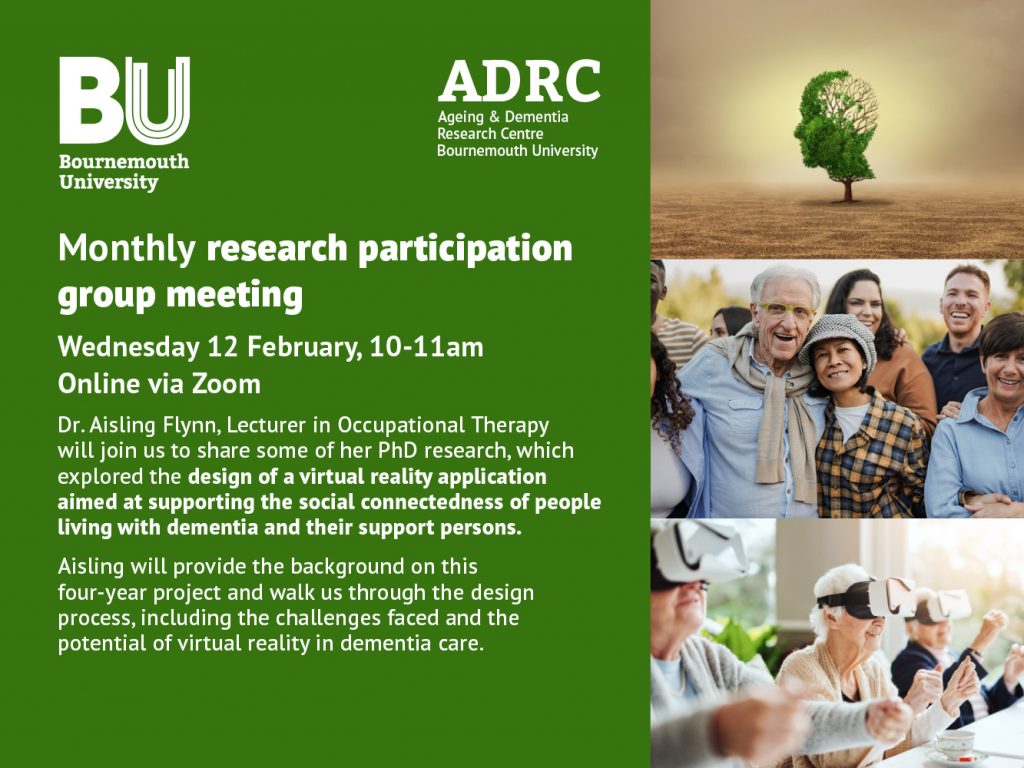
Join our February research participation group meeting

Latest research and knowledge exchange news at Bournemouth University

 Are you hopeful that you research is going to make a difference? Have you considered the variety of ways your research can have an impact? This session will help you consider the ways in which you can demonstrate the impact your research is having and start you off on planning an impact strategy.
Are you hopeful that you research is going to make a difference? Have you considered the variety of ways your research can have an impact? This session will help you consider the ways in which you can demonstrate the impact your research is having and start you off on planning an impact strategy.
BU’s Impact Advisor, Adam Morris, will facilitate this online session on 03/02/25, 14:00-16:00.
Book your place here
There is one week left to apply to run an event at the British Science Festival 2025!

The British Science Festival will take place in Liverpool from the 10 – 14 September 2025, and will be hosted in partnership by the University of Liverpool and Liverpool John Moores University.
The programme showcases cutting-edge science, technology and ideas that challenge, inspire and excite audiences. Each year, thousands of people come together to celebrate the latest developments in research and engage in open discussion about issues affecting our culture and society. 
Open Call for proposals – Do you have an idea to engage public audiences with science and research?
Anyone can propose an event and the Festival celebrates science in its broadest sense. The organisers are looking for proposals from individuals, researchers, industry professionals, artists, writers, organisations, charities, academic institutions, and more. They aim to programme a range of formats from talks to drop-in activities and creative content that challenges perceptions of what science is and can be.
The Festival is free and open to all, but content should be appropriate for an adult (16+ audience).
More information, including how to submit a proposal, can be found here
The deadline for proposals is 23.59 20 January 2025.
If you have any questions, or if you would like to discuss your proposal, please email festival@britishscienceassociation.org.
Alternatively, should you wish to discuss your application with BU’s Public Engagement with Research team, please contact publicengagement@bournemouth.ac.uk.

A very happy New Year to all from the RKEDF team!
Book now for RKEDF training in January 2025
Click on the titles to find further details and book your place
Compelling Impact Narratives for Funding Success
Tuesday 28 January 10.00-12.00 – in person, Talbot campus
Struggling to effectively communicate the potential impact of your research in funding applications? Our training session, Impact and Funding Bids, will equip you with the practical tools and knowledge to develop effective plans of impact, articulate these in proposals and increase your success rates.
This session is intended for academics working on a proposal at the time of the session. It could be an early-stage idea, or a specific proposal for a funder. Please bring your proposal with you to the session to work on.
Future Leaders Fellowship – Meet Matt!
Tuesday 28 January 14:00 – 15:00 – in person, Talbot campus
Meet Professor Matt Ryan, Professor of Governance and Public Policy from Southampton University, who will be visiting for an ‘in person’ talk and networking session on the Talbot campus. His research crosses several disciplinary boundaries and focuses on democratic innovation, participation in politics and policymaking, as well as improving social research methods.
Epigeum Research Skills Toolkit
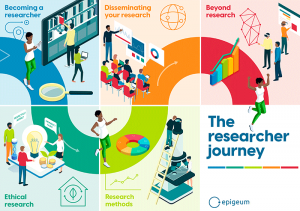 Do you want to refresh your researcher skills? Have a look at the Epigeum Research Skills Toolkit (on demand online modules). Further information on how to access Epigeum courses can be found here
Do you want to refresh your researcher skills? Have a look at the Epigeum Research Skills Toolkit (on demand online modules). Further information on how to access Epigeum courses can be found here
Please help us in avoiding any waste of resources; make sure you can attend or cancel your booking prior to the session. For any further information, please contact RKEDF@bournemouth.ac.uk
The British Science Festival will take place across the city of Liverpool from the 10 – 14 September 2025, and will be hosted in partnership by the University of Liverpool and Liverpool John Moores University.

Anyone can propose an event. Artists, researchers, community activists, critical thinkers, industry partners, charities and beyond- from across disciplinary backgrounds are invited to submit proposals events, activities or installations.
 The British Science Festival celebrates science in its broadest sense. The programme showcases cutting-edge science, technology and ideas that challenge, inspire and excite audiences. Each year, thousands of people come together to celebrate the latest developments in research and to engage in open discussion about issues affecting our culture and society.
The British Science Festival celebrates science in its broadest sense. The programme showcases cutting-edge science, technology and ideas that challenge, inspire and excite audiences. Each year, thousands of people come together to celebrate the latest developments in research and to engage in open discussion about issues affecting our culture and society.
While the primary focus is on events programming, the organisers are keen on programming public installations and welcome proposals that could be hosted throughout the festival in site-specific locations like shopping centres, public buildings and town squares.
The Festival is free and open to all, but content should be tailored to an adult (16+) audience.
The target audience for the programme is:
The organisers particularly welcome creative content that challenges perceptions of what science is and can be. They anticipate that the majority of events in the 2025 programme will use a range of participatory formats and take place outside traditional lecture-theatre settings. A limited number of talks and panel discussions will be programmed.
To submit a proposal for an event please complete the proposal form.
The deadline for open call applications is 23.59 on Monday 20 January 2025.
Before developing and submitting your proposal, you are encouraged to read the FAQs
If you have any questions, or if you would like to discuss your proposal, please email festival@britishscienceassociation.org.
Alternatively, should you wish to discuss your application with BU’s Public Engagement with Research team, please contact publicengagement@bournemouth.ac.uk.
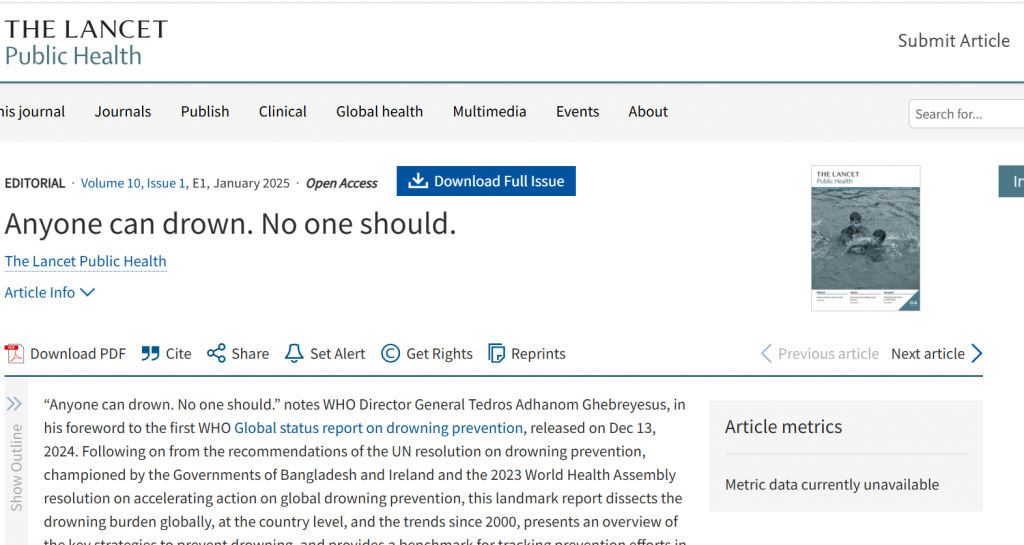 The first editorial of The Lancet Public Health [1] highlights a public health issue close to our work in Bangladesh, namely the risk of drowning, especially in young children. “Anyone can drown. No one should” are the words of the Director General of the World Health Organization (WHO) in its first Global status report on drowning prevention, published two weeks ago (Dec. 2024). According to The Lancet Public Health this landmark report dissects the drowning burden globally, at the country level, and the trends since 2000, presents an overview of the key strategies to prevent drowning, and provides a benchmark for tracking prevention efforts in the future. Importantly, this report sheds light on a tragic, neglected, mostly preventable public health issue.
The first editorial of The Lancet Public Health [1] highlights a public health issue close to our work in Bangladesh, namely the risk of drowning, especially in young children. “Anyone can drown. No one should” are the words of the Director General of the World Health Organization (WHO) in its first Global status report on drowning prevention, published two weeks ago (Dec. 2024). According to The Lancet Public Health this landmark report dissects the drowning burden globally, at the country level, and the trends since 2000, presents an overview of the key strategies to prevent drowning, and provides a benchmark for tracking prevention efforts in the future. Importantly, this report sheds light on a tragic, neglected, mostly preventable public health issue.
 We are grateful to The Lancet Public Health for raising this important issue in 2025, since Bournemouth University (BU) is currently engaged in research project in this field called ‘Sonamoni’. This an interdisciplinary study is a collaboration with CIPRB (the Centre for Injury Prevention and Research, Bangladesh), the University of the West of England (in Bristol), the University of Southampton, the Royal National Lifeboat Institution (RNLI), and Design Without Borders (DWB) in Uganda. Sonamoni aims to design and develop interventions to reduce the number of young children drowning in Bangladesh.
We are grateful to The Lancet Public Health for raising this important issue in 2025, since Bournemouth University (BU) is currently engaged in research project in this field called ‘Sonamoni’. This an interdisciplinary study is a collaboration with CIPRB (the Centre for Injury Prevention and Research, Bangladesh), the University of the West of England (in Bristol), the University of Southampton, the Royal National Lifeboat Institution (RNLI), and Design Without Borders (DWB) in Uganda. Sonamoni aims to design and develop interventions to reduce the number of young children drowning in Bangladesh.

This public health project is funded by the National Institute for Health and Care Research (NIHR) through its Research and Innovation for Global Health Transformation programme. For more information, visit the NIHR website.
The interdisciplinary team at BU includes three faculties and six member of staff: Dr. Mavis Bengtsson, Dr. Kyungjoo Cha, Dr. Mehdi Chowdhury, Dr. Yong Hun Lim, Mr. John Powell, and Prof. Edwin van Teijlingen. We recently published the first paper ‘Drowning Prevention should be a Public Health Issue in Nepal related to this project [2].
References:
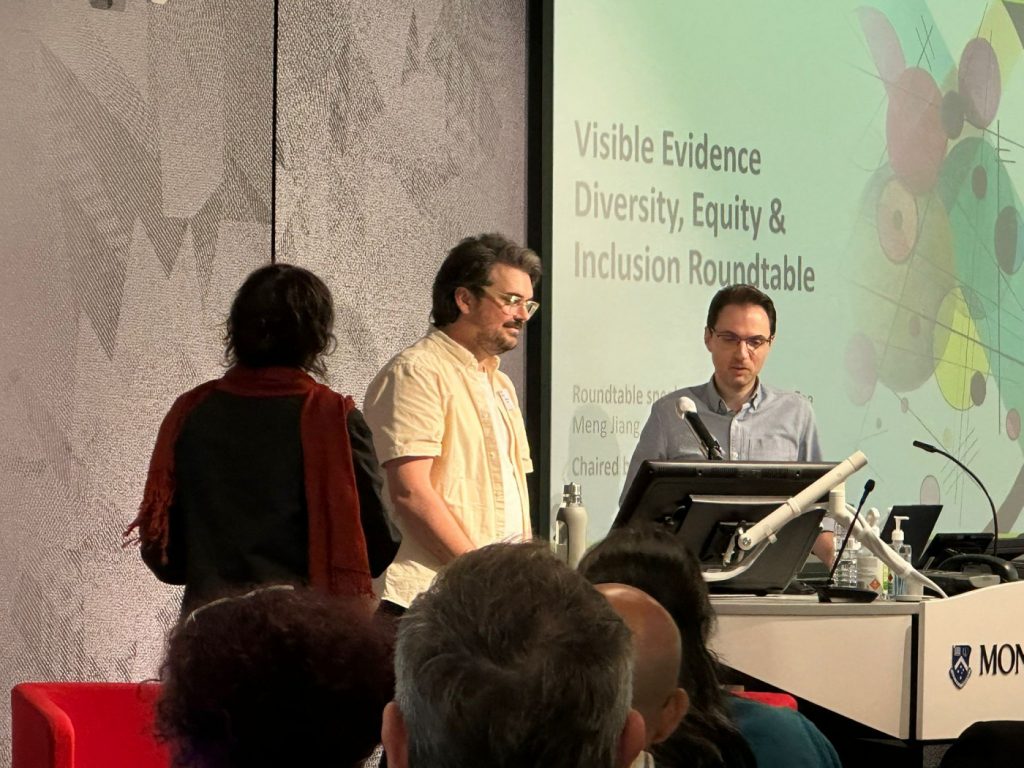
Dr. Catalin Brylla, Principal Lecturer in Film and TV (FMC) has been appointed Chair of the Visible Evidence Diversity, Equity and Inclusion Advisory Committee. The committee’s programme was launched at the 2025 Visible Evidence Conference at Monash University in Melbourne.
Visible Evidence (VE) is the largest and oldest documentary studies community, having produced a wealth of research by renowned scholars, such as Bill Nichols, Michael Renov, Brian Winston, Patricia Zimmerman and Kate Nash. It has a long history of interdisciplinary and transdisciplinary research, fostering links between the academy and the media industry, and fusing documentary research, practice and education.
The VE DEI Advisory Committee has been established by the VE Governing Council to diversify its members and expand its outreach. The committee consists of Catalin Brylla as chair, Slava Greenberg, Tory Jeffay, Patrick Kelly and Geoffrey Lokke. Brylla has drawn up a plan to reach early-career researchers, Global South scholars/practitioners and other underrepresented academic and non-academic communities. He draws on his experience as Chair of the Society for Cognitive Studies of the Moving Image DEI Committee, founding member of the Journal of Media Practice’s Diversifying and Decentralizing Research Working Group, and Deputy Director of BU’s Centre for the Study of Conflict, Emotion and Social Justice.
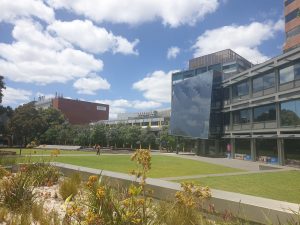
The committee’s programme was launched at the 30th Visible Evidence Conference at Monash University, Melbourne, in December 2025. It featured a roundtable with scholars and media practitioners Dr. Shweta Kishore, Dr. Zoe Meng Jiang, Prof. Kate Nash and Prof. Pratāp Rughani, who provided their perspective of diversity and inclusion. The conference also featured the committee’s new mentorship initiative, which pairs up early-career members—including graduate students, junior faculty members and emerging filmmakers—with mid-career and senior scholars or media professionals.
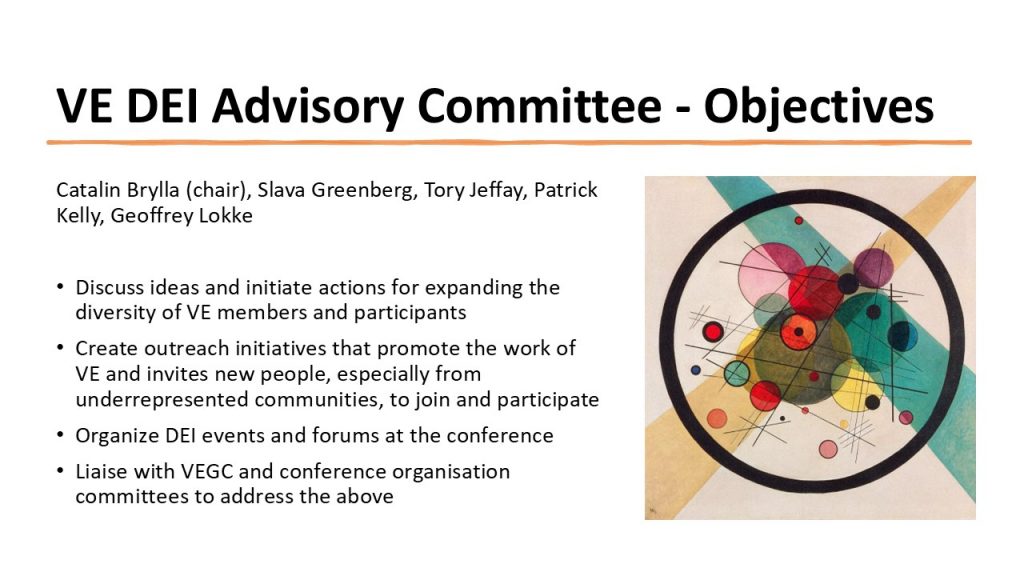
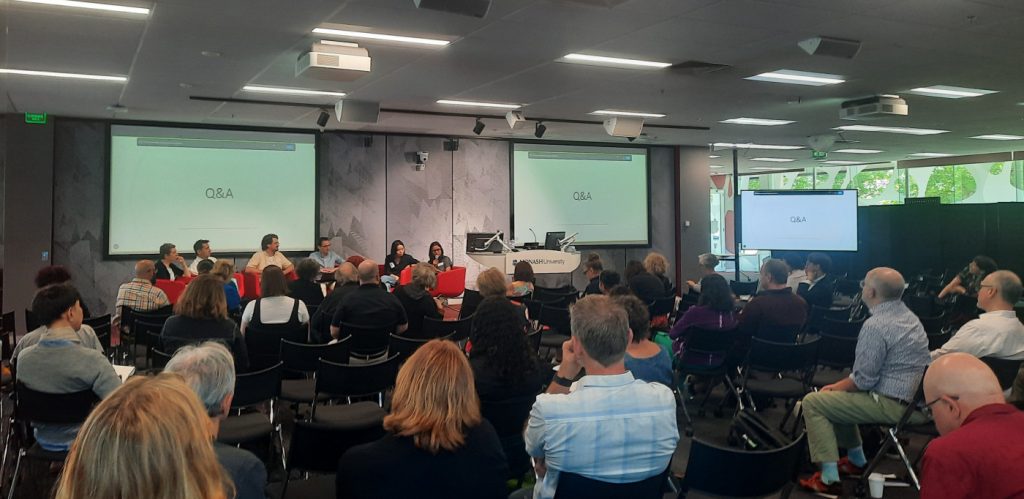
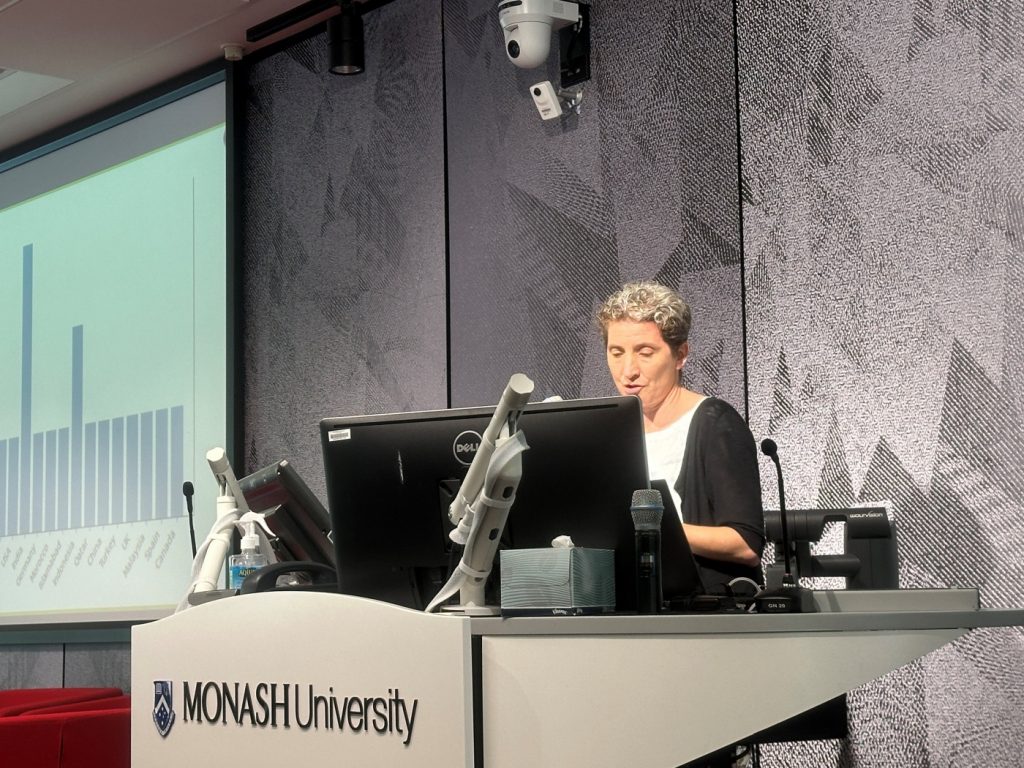
Image above: Prof. Kate Nash presents data on institutional affiliations of first authors submitting to the journal Studies in Documentary Film; there is a distinct lack of submission from Global South scholars.
Some of the committee’s action plans include:
The VE DEI Committee’s programme was launched at Monash University Melbourne, on the unceded lands of the Bunurong Boon Wurrung and Wurundjeri Woi Wurrung peoples of the Eastern Kulin Nation. We pay our deepest respect to the traditional owners of this land and acknowledge their ongoing relationship with the lands and waterways. We pay our respect to all Indigenous people, and their elders past and present.
This week ResearchGate notified us that our methods paper ‘The Importance of Pilot Studies‘ [1], published 22 years ago in The Nursing Standard, 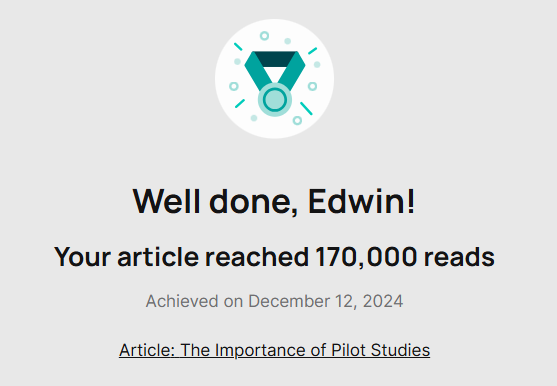 has now been read 170,000 times! Prof. Vanora Hundley and Prof. Edwin van Teijlingen wrote this more elementary paper after publishing an in-depth academic paper on a pilot study into assessing maternity care in Scotland [2]. The latter paper described their learning from a pilot study which we conducted prior to a cross-national study of births in Scotland.
has now been read 170,000 times! Prof. Vanora Hundley and Prof. Edwin van Teijlingen wrote this more elementary paper after publishing an in-depth academic paper on a pilot study into assessing maternity care in Scotland [2]. The latter paper described their learning from a pilot study which we conducted prior to a cross-national study of births in Scotland.
The methods paper in the Nursing Standard is also their most highly cited paper. Today Google Scholar lists it with 2,035 citations, interestingly this is not the case on SCOPUS as The Nursing Standard is not listed on SCOPUS. Researchers seem to be quoting this paper in their research methods section when they have done pilot or feasibility study for a larger-scale study.
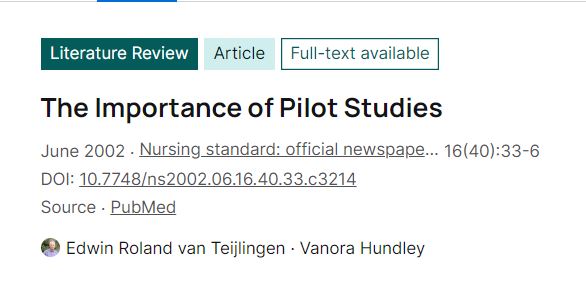
References:
The FLIE report:
FLIE joined colleagues from BU and Imperial College to present at the NK Fusion conference on Digital Education and AI in the 21st Century. We talked about the creation of our AI Literacy resources for staff and students and showcased some of the innovative practice of BU academics who have worked with us employing digital tools such as 360 cameras, immersive films and H5P interactive learning objects. It was a really interesting day with some really thought-provoking speakers.
Further information email Debbie Holley: dholley@bournemouth.ac.uk


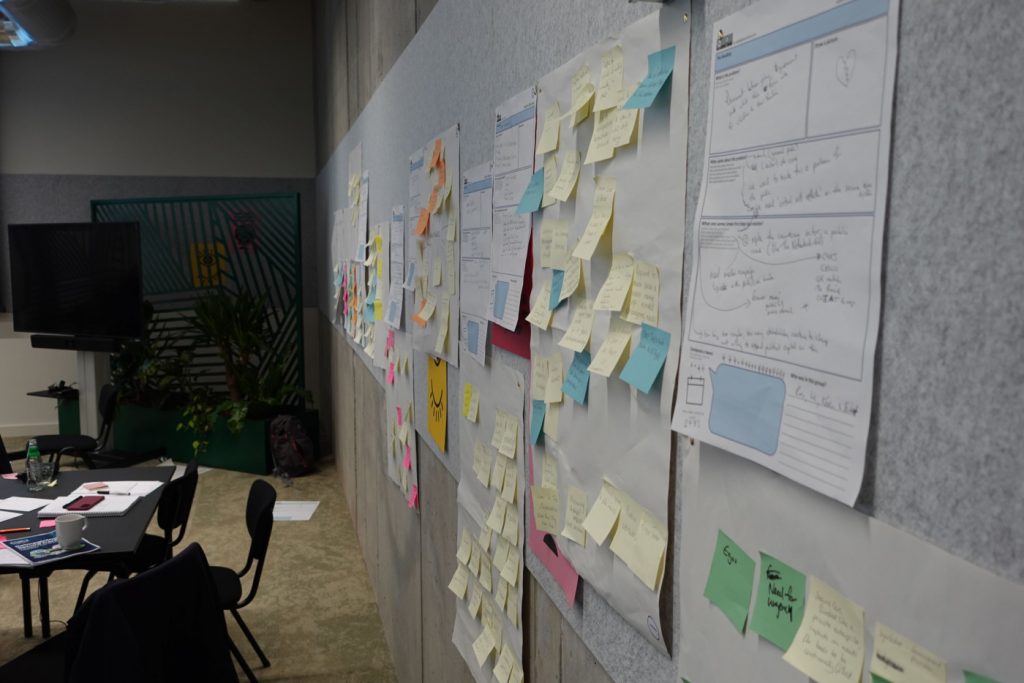
The event was designed to explore critical questions in developing secure care for children, offering national and global perspectives. Secure care, in its traditional form, is locked institutional care for children aged 10 to 17. Children can enter secure care either on criminal justice grounds, when aspects of their behaviour are considered to pose a risk of harm to others, or on welfare grounds, when the risk of harm is to themselves, though there is often an overlap. Our workshop aimed to explore how the continuum of services, including secure care could evolve to better meet the needs of the children, and young people who may require such responses and often come from challenging backgrounds, with experiences of childhood trauma and poly-victimisation. The event’s target audience included practitioners, managers, and stakeholders who are involved with secure care for children.
To start with the most important bit, the food at the venue – which itself was very cool – was incredible. The day started with freshly baked pastries, followed by cakes mid-morning, a delicious grazing platter for lunch (with some accidental haggis consumption by one member of our party!), and an unexpected, yet very much enjoyed, basket of pittas, olives and homemade houmous in the afternoon. If nothing else, our attendees went home full, but we have a feeling they took away much more than satisfied taste buds.
Kicking off the day, three experts provided insightful presentations to secure care in their respective jurisdictions. First, Donna McEwan and Dan Johnson presented the recently released CYCJ ‘Re-Imagining Secure Care’ report. Donna detailed key questions that need to be asked when we think about what the future of secure care could look like, including:
The second presentation, by Eva Mulder (Professor by Special Appointment at the University of Amsterdam), was particularly impressive as Eva and her colleagues had spent the night standing on the street following a fire alarm at their hotel, and Eva had not had any sleep. Hats off to Eva! Eva described her research exploring how secure institutions can be made to look and feel like home, using young people’s photographs of home. It was interesting to hear how ‘home’ was conceptualised in terms of feelings – for example, home is somewhere where there are people you know, you feel like you belong, you can be alone when you want to be, there is food that you like, and you feel free. Eva encouraged us to contrast these ideas with how institutional buildings make children feel. Eva described new small-scale residences for children in the Netherlands, without locked doors, where there is continuity with a small team of staff and integration with the community. Research in these places revealed that staff feel that they can develop better relationships with the young people, and the young people want to make more of an effort with the staff and their treatment, and parents feel more included. Eva ended by describing how there is a campaign in the Netherlands to end secure care completely, and how this requires a solution within the community that can keep children safe.
Last, but by no means least, Dr Kate Crowe took to the stage. Kate was awarded a Churchill Fellowship in 2022 to investigate alternatives to secure care in Hawaii, Canada, Scotland and the Netherlands. In 2023 she was awarded a Creswick Fellowship and she travelled to Iceland, Finland and Scotland to investigate the position and design of secure care in light of Australian jurisdictions raising the minimum age of criminal responsibility (MACR). Kate prompted the audience to consider how models of secure care might need to change as the MACR increases. She also posed the perennial question in this area – should children on welfare placements be placed alongside children deprived of their liberty on criminal justice grounds? Along with other details from her travels, the audience were very intrigued to find out from Kate that all secure facilities in Finland have saunas!
With these thought-provoking presentations in mind, participants were divided into six focus groups. Discussions between the group members were audio recorded so that they could be captured as research data. Participants explored critical questions, such as:
At the end, participants explored three core questions that aim to lead to calls for action in the participant’s respective spheres of influence:
Several preliminary findings emerged from the discussions:
This event was about exchanging information, but it also aimed at suggesting meaningful options for further development. The participants shared creative ideas, and the discussions showed a willingness to push for progress to improve care for arguably the most vulnerable children in out-of-home care.
One of the most interesting ideas was to embed secure care services more closely in local communities. This would promote closer cooperation among providers, mental health services, and educational support systems.
At the end of the event, it became clear that this seminar was a stepping stone towards future progressive developments in secure care. Participants identified critical areas for immediate action, both within secure care settings and in the broader community and at the intersection between these two worlds. This is crucial for building a system that protects children and communities and supports their long-term rehabilitation and reintegration.
This workshop was a success because it allowed participants to share knowledge, discuss challenges, and develop actionable solutions for the future of secure care. It is an essential reminder of how far we have come—and how much further we want and need to go—to ensure that secure care can continue to meet the needs of children and young people who meet the criteria for secure care. This event provided an excellent opportunity to reflect on the challenges in secure care and consider future development options.
This event also acts as a reminder of how much can be achieved when a group of like-minded people with a common goal come together. We feel privileged to be working with our national and international partners, and we look forward to our next event, wherever in the world that might be. Our thanks go out to our Faculty at Bournemouth University who funded this event.
The ESRC Festival of Social Science 2024 has come to an end, successfully bringing together diverse audiences to explore, learn, and engage with BU’s research.
The 2024 festival, which included 324 nationwide events, had ‘our digital lives’ as a central theme. Many of the events examined the relationship between humans and digital technology, exploring current threats and opportunities, as well as imagining what life might be like in the future.
For the 13th year, BU took part in the festival, drawing over 250 attendees to five engaging events, two of which were also featured in the University of Southampton’s Arts and Humanities Day on Saturday 9 November. In partnership with the University of Southampton for the second consecutive year, the festival showcased a programme of events, ranging from discussions on well-being and cybersecurity to an exhibition highlighting the voices of young LGBTQ+ individuals.

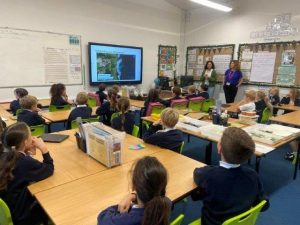
Avonwood Primary School
Our festival programme began with ‘Underwater Farms – The Magic of Seaweed’ an exciting opening event for 61 year 3 students at Avonwood Primary School.
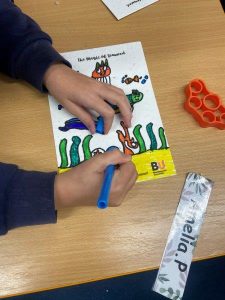
Activities with pupils at Avonwood Primary School
BU researchers Anastasia Vayona and Kirthana Pillay visited two classes, where they introduced children between the ages of 7-8 to the wonders of seaweed as a food source and highlighted how underwater farming could play a crucial role in creating a more sustainable future for agriculture. The children were particularly keen to try the seaweed scones!
“…a really informative and fun event that was perfectly pitched for the age of participants…it gave them a chance to explore food and nutrition in a fun, interactive context” feedback from a teacher at Avonwood Primary School
The next event in our programme, ‘Take a Meno(pause)’ exploring well-being through yoga for mid-life -was an interactive session at Pavilion Dance, focusing on the benefits of yoga during the menopause years.
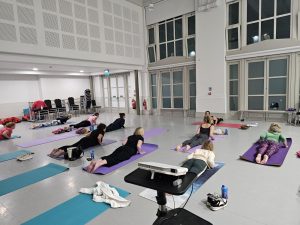
Yoga practice led by Dr Hecquet
Dr Juliette Hecquet’s research looks at yoga’s effectiveness in managing the physical and emotional symptoms of perimenopause, menopause, and beyond. By integrating body and mind, yoga promotes health, strength, and overall well-being during this life stage.
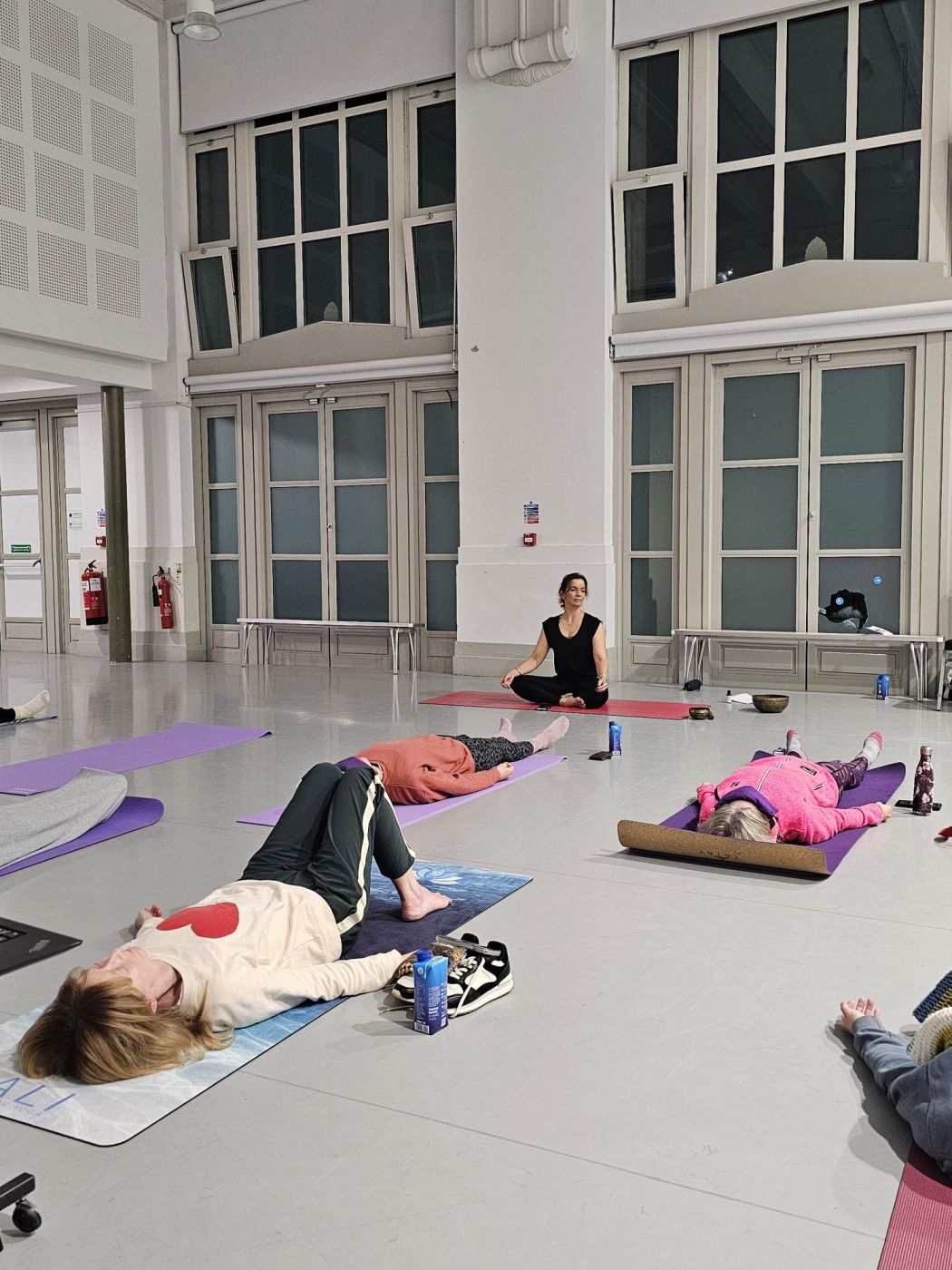
Yoga breathing exercises
Participants learned how yoga can enhance physical and mental health and how mindfulness can support the transition through mid-life. The session also included a guided yoga practice led by Dr Hecquet, with poses and breathing exercises designed to deepen relaxation and improve well-being throughout the menopause journey.
“…very professional and I thoroughly enjoyed it.” feedback from an attendee
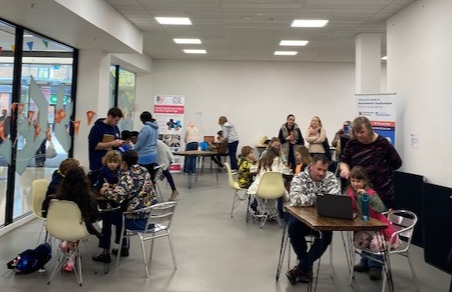
Board game activities at Cybersecurity Family Fun day in Poole Dolphin Centre
BU’s CyGamBIT Team hosted a ‘Cybersecurity Family Fun Day’ at Gather, the hub for community events at the Dolphin Centre in Poole. During half term, this interactive cybersecurity day gave participants of all ages the opportunity to discover practical tools to enhance digital safety, with hands-on activities that made learning about cybersecurity both fun and accessible
 Guided by BU computer science researcher Dr Jane Henriksen-Bulmer and CyGamBIT co-founder and BU PhD student Emily Rosenorn-Lanng, families left with practical takeaways to help keep their information secure and a better understanding of how digital safety affects everyone.
Guided by BU computer science researcher Dr Jane Henriksen-Bulmer and CyGamBIT co-founder and BU PhD student Emily Rosenorn-Lanng, families left with practical takeaways to help keep their information secure and a better understanding of how digital safety affects everyone.
“…granddaughter loved how it taught her about safety online” feedback from an attendee
The ‘Communities of wellbeing: the digital lives of LGBTQ+ young people’ exhibition was displayed at the Lighthouse in Poole from 26 October – 16 November. The artwork highlighted the powerful stories of young LGBTQ+ individuals, who shared their experiences of creating inclusive online spaces where they feel safe, joyful, and have a sense of belonging.
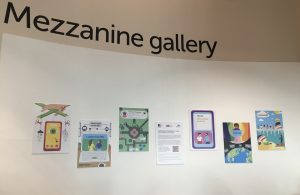
Exhibition displayed at the Lighthouse in Poole
Dr Jayne Caudwell and Dr Francesca Gaunt hosted a series of workshops with LGBTQ+ youth. Through these group discussions, six key themes emerged, including topics like the experience of coming out as LGBTQ+ in online spaces. These conversations inspired the creation of artwork reflecting the themes explored.
The exhibition images and content from the workshops will also be used to create a digital version of the exhibition, coming soon!
“…inspiring – we all have far more in common than our differences – we all need respect and acceptance” feedback from an attendee
Our online workshop, ‘Teaching for Wellbeing: Connecting Practice with Socio-Emotional Support’, led by Dr Esther Anwuzia, covered effective teaching practices to support students’ well-being in today’s challenging environment.
Former teachers Elaine Baker-Smith and Jerry Whitton with a combined 55 years of experience also participated in the session, offering their perspectives on effective teaching practices, and promoting student well-being.
Dr Anwuzia’s research explores how heavy workloads restrict teachers’ ability to reflect beyond teaching and grading. Since the pandemic, an increasing number of students with social and emotional difficulties are absent from school. Focused teaching can help build students’ confidence and support responsible decision-making.
The workshop provided an opportunity for teachers to connect, exchange insights, reflect on their experiences, and explore strategies for making a positive impact on students’ lives.
“… I remember having a teacher who explained information in lots of different ways to help with our understanding”
“…really brilliant presentation!” feedback from attendees
A Special Feature – Southampton Arts and Humanities Day
For the first time, BU researchers were invited to participate in the University of Southampton’s Arts and Humanities Day, which took place on Saturday 9 November in the city’s Cultural Quarter. The day offered a range of free interactive activities, workshops, talks, performances, and exhibits.
Attendees had the opportunity to engage with the Young LGBTQ+ stories exhibition, which attracted more than 90 viewers, while Dr Esther Anwuzia hosted a drop-in session on Connecting teaching with student wellbeing, making her own connections with more than 30 educators and members of the public.
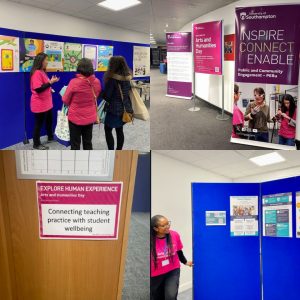
Southampton Arts and Humanities Day
Thank you
A big thank you to everyone who joined us and contributed to this year’s ESRC Festival of Social Science. Your involvement helped make our events a meaningful celebration of the positive impact social science has on our communities.
Applying for the ESRC Festival – what you need to know
Event leads were chosen through a competitive internal application process, with selections determined by a panel of researchers and professional services staff. BU’s Public Engagement Team provided support to help bring their creative and engaging event ideas to life.
If you would like to start discussing your ideas, please get in touch with the public engagement with research team at publicengagement@bournemouth.ac.uk.

Dr. Catalin Brylla has successfully completed the first stage of his British Academy-funded project Blindness and Media Engagement – A Model for Improving Wellbeing through Research and Intervention. The lives of blind people have been negatively affected by social exclusion, as well as the sensory challenges of having impaired vision. This project explores the engagement with digital media for improving physical, psychological, social and economic wellbeing in the visually impaired community.
The team held two, in-person knowledge exchange workshops with the partners in order to introduce the team and the project’s objectives, as well as to discuss the role of digital media and wellbeing in the VI community. The main aim was to hear about lived experiences of creating and consuming media. They discussed social and personal barriers to media engagement, as well as how active media use can improve the lives of visually impaired people. They linked these insights to the partners’ agendas, their current and past media initiatives and their existing resources. This helped tentatively identifying opportunities and strategies for co-designing media engagement training for their members.
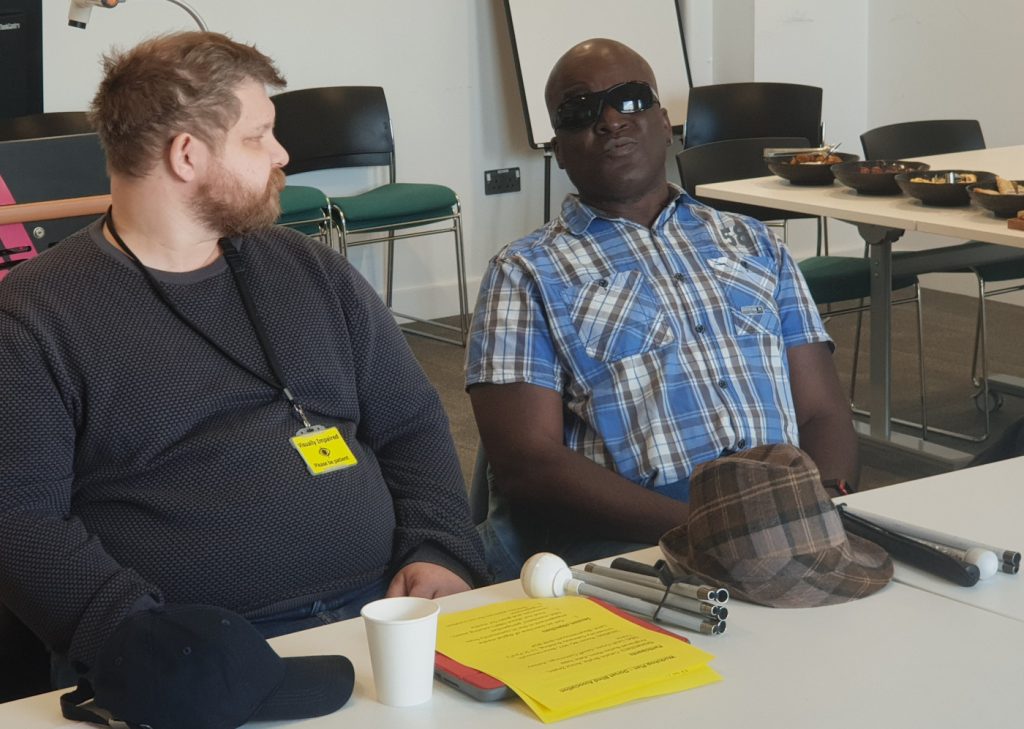
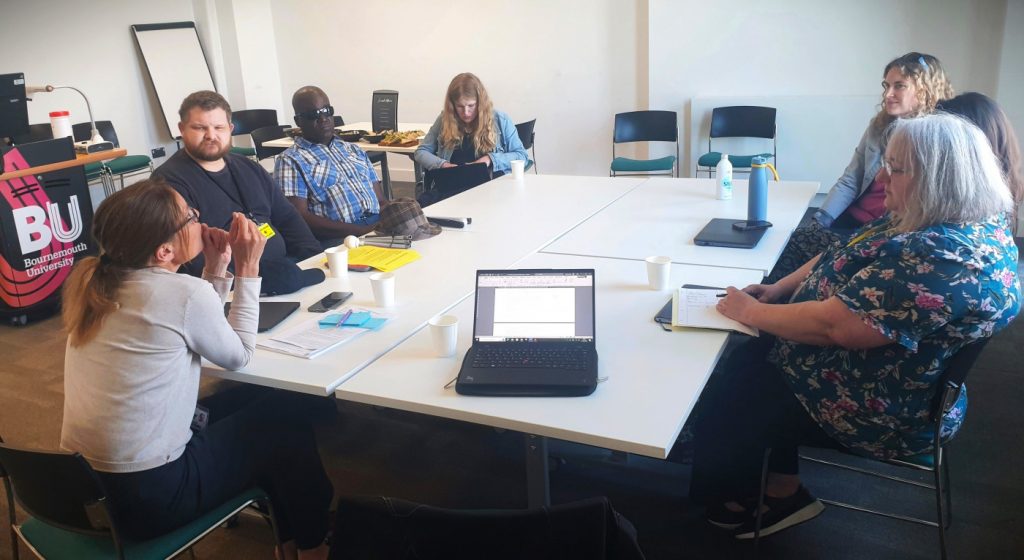
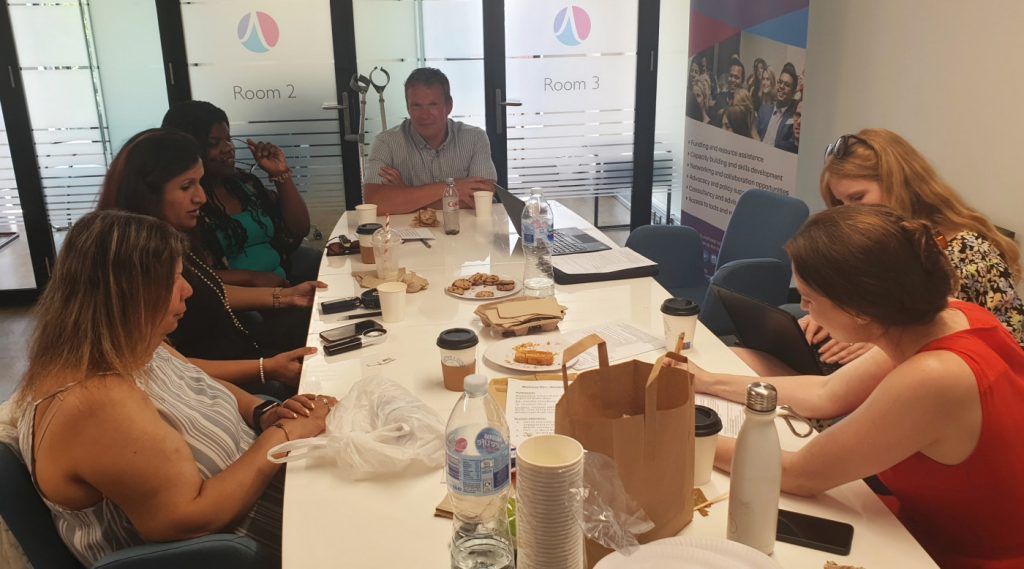
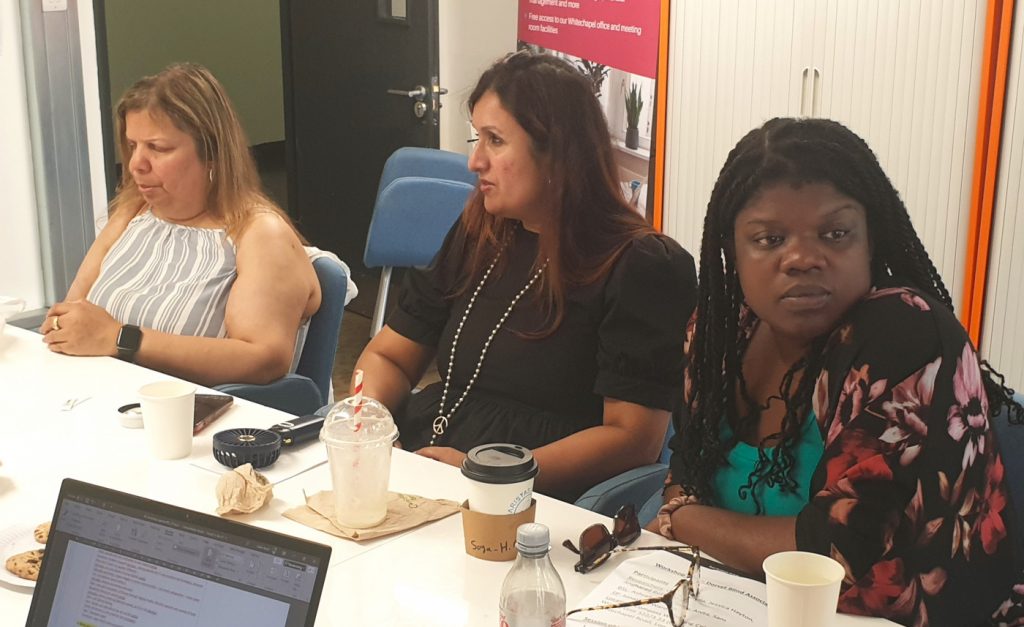
The full project team consists of:
Dr. Catalin Brylla, Principal Lecturer in Film and TV and Deputy Head of CESJ, has chaired the DEI Committee for the Society for Cognitive Studies of the Moving Image since 2022, launching several initiatives. At this year’s conference in Budapest, the DEI focus was on “Research and Social Justice”, featuring a roundtable discussion with Prof. Srivi Ramasubramanian (Newhouse School at Syracuse University) and Dr. Wyatt Moss-Wellington (University of New England). The roundtable, moderated by Dr. Ari Purnama, addressed the following questions:

Another initiative has been a mentor-mentee programme that has provided support for early-career research on teaching, bidding and wellbeing, organised by committee member Dr. Kata Szita.
Brylla is currently developing with Prof. Jens Eder (Babelsberg University) a model to implement and study the social impact of documentaries, which they presented at the conference in Budapest:

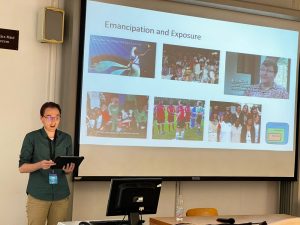
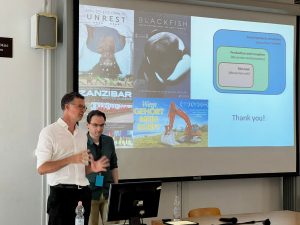
The model is partly based on Brylla’s latest monograph ‘Documentary and Stereotypes: Reducing Stigma through Factual Media‘ (Palgrave 2023) and will be further developed in a research project that compares impact strategies in the UK and Germany.
The Public Engagement with Research Team are running two workshops this month: Evaluation of Engagement and Advanced Evaluation.
These sessions will be delivered by Dr Jamie Gallagher, one of the most experienced engagement trainers in the UK. Jamie is a dynamic and engaging trainer who makes these sessions enjoyable as well as useful.
It is recommended that both sessions are attended to gain the full benefit. The sessions will build skills from the basic principles of evaluation, through to being able to develop evaluation plans for even the most complex topics, exploring data capture, analysis and reporting. You’ll also learn how to write evaluation reports for funders or for the REF (Research Excellence Framework).
While both sessions are recommended, attending just the first session may be appropriate for your needs. It is advised against only attending the second session.
This workshop will highlight what you need to ask yourself, and the public, to ensure you can demonstrate the success of your intervention and capture the long term impact of it.
Successful public engagement can benefit research, researchers and the public – but how do you go about demonstrating this change? This workshop will guide you through the best evaluation processes showing you when, why and crucially how to use evaluation to give you reliable and clear data. It will highlight how to demonstrate success to funders, record impact for the REF, help to improve your processes, and give you a better understanding of the people you are connecting with.
At the end of the workshop, you will be able to:
To book a place on this workshop please complete the booking form.
Taking an in-depth look at evaluation, participants will explore data capture, analysis and reporting. From surveys to focus groups, you will learn how to format powerful questions and report meaningful data. Discover how to develop evaluation plans for even the most complex topics. You will also learn how to write evaluation reports for funders or for the REF.
This workshop requires good base knowledge of evaluation, ideally from attending the previous Evaluation of engagement workshop.
To book a place on this workshop please complete the booking form.
For any queries regarding either of these sessions please contact the Public Engagement team: publicengagement@bournemouth.ac.uk.
Join the next meeting of the Public Engagement with Research Network
Find out how you can use public engagement activities to carry out new research with your public participants.
We’ll look at how to seamlessly integrate research into your activity, how to navigate ethics requirements and what this process can do for your work.
Professor Debbie Holley and Dr Holly Henderson will share their experience of doing research with children and adults as part of a fun family activity day for the ESRC Festival of Social Science 2022.
This meeting will take place on Wednesday 22 February 10-11am at BG217.
You can join the network and find out about future meetings, join our BU Public Engagement with Research Network. Check under ‘Meetings’ for upcoming sessions.
If you have any questions, please email the team.
office fNews galore. We cover all the major news and provide short commentary and links on the specialist interest topics.
The next general election is constantly on the minds of policy makers. Last week Kier Starmer rowed back from Labour’s traditional position of abolishing HE tuition fees. This week attention has turned to what could be learnt from Wales’ review and reform of education which has resulted in a joined up tertiary education system. Andy Westwood writes for Wonkhe suggesting that Wales could be a blueprint for policy and suggesting Labour should prioritise tertiary reform over tuition fees.
Some snippets to whet your interest:
Chris Millward (former Director for Fair Access at OfS) agrees with Westwood and is keen to bring technical and academic together in a cohesive tertiary system. He also suggests Government could reduce regulation in the areas that are a priority such as higher and degree apprenticeships, modular (shorter) learning, and advanced technical or research courses. Especially if they’re in geographical areas where the Government wants to drive growth and attract investment by aligning skills and innovation around a university presence. Finally, he suggests increasing fees (only by inflation) where institutions can demonstrate excellence beyond a threshold (I.e. we’re back to TEF related increases – which the House of Lords originally threw out). You can read Millward’s blog for Research Professional in full here.
Lifelong Learning
Earlier this week THE reported the Government were considering uncontroversial legislation surrounding the Lifelong Learning loan entitlements. These loans allow students to borrow up to the equivalent of four years’ worth of student loan funding across their whole life to spend as they will including on shorter or modular courses (more here). The loans are expected to be particularly attractive to mature students who wish to retrain or change careers (assuming they don’t already have a degree). Previous PM Boris Johnson pledged to introduce the LLE by 2025.
The background:
The rumours were correct! The Government introduced the Lifelong Learning (HE Fee Limits) Bill on Wednesday. The Bill aims to build upon previous legislation and provides the legal framework to underpin credit-based learning, set fee limits and update legislation in relation to the Access and Participation Plans. It:
The Bill’s financial commitments remain as expected – students may receive a loan entitlement, equivalent to four years of post-18 study (£37,000 in today’s fees) which can be used over their working lives. This will be available for both modules of courses and full courses, whether in college or at university. If will fund provision between level 4 and 6 so first degrees, higher technical qualifications, HNCs and HNDs.
Wonkhe add: It is recognised that not all courses fit a credit-based modular model – nursing is cited as one example of a “non-credit-bearing” course that will be funded at a “default” level equivalent to a standard number of credits. Prices for all credits will vary depending on institutional registration, TEF award, access and participation plan status, and specific fee limit designation as of now – there will also be separate credit values for placements, study abroad, and credit transfer. Of course, Wonkhe also has a new blog on the topic.
Commenting on the Bill’s introduction Dr Arti Saraswat, AoC HE Senior Policy Manager, makes some good points:
There is lots of research related news. Here are a series of links and blogs which cover the main announcements.
Innovation vision: Last Friday Chancellor Jeremy Hunt set out his goals for the UK. On research and innovation he included:
And lots more:
Parliamentary Questions:
Matt Western has been demonstrating his worth as Shadow HE Minister recently by asking a series of useful parliamentary questions. This includes Matt questioning Minister Halfon on whether the OfS will increase the registration fee for universities (because the fee is set by DfE). Halfon’s response:
It’s this last element that’s the kicker because fee increases are expected to be tied to the newer closer regulatory interventions on course quality and free speech.
You’ll recall a couple of weeks ago that the mission groups wrote to a select committee urging them to look how OfS regulate the sector. The Russell Group have spoken out again, on the same issue because the proposed increase in registration fees is of 13-15% whilst student maintenance loans were only uplifted by 2.8%. Dr Tim Bradshaw, Chief Executive of the Russell Group stated:
Dr Tim Bradshaw wrote further on the topic in a HEPI blog and you can also read the Russell Group’s analysis on student losses as maintenance loans fail to keep up with inflation here.
Another corker from Matt Western that the Government slightly sidestepped is whether the OfS Director for Free Speech will commit to the IHRA definition of antisemitism. All HE institutions have been pushed hard in recent years to sign up to the definition. Minister Coutinho stated: … We remain committed to the IHRA definition and our belief that providers should adopt it… The Higher Education (Freedom of Speech) Bill will require reasonably practicable steps to be taken to secure freedom of speech within the law. The Director will oversee the free speech functions in that context.
The OfS, who haven’t been sitting idly by whilst the Russell Group launched their offensive. On Friday Wonkhe reported that: The Office for Students (OfS) is seen by providers as “seeking conflict”, lacking independence from government, and poor at communicating, according to findings of independent research into its relationship with the sector. As a result it has set out plans to “refresh” its engagement with providers – a blog from chief executive Susan Lapworth sets out actions including better communication channels, careful consideration of consultation lengths, and visits to institutions to “improve mutual understanding”.
The research that Wonkhe mentioned was actually published in July and this entertaining Wonkhe blog picks out the highlights from the research feedback. Seven months passed in which OfS had plenty of time to ruminate on their response/action and on Thursday Susan Lapworth published her own blog setting out what OfS would do. Here’s a comment from ‘Andy’ about Susan’s blog (published on Wonkhe):
TEF: Finally the last thing anyone who was involved in the recent TEF exercise will want to read about now is…well…TEF. There is an easy read blog (yes it’s Wonkhe again) which contemplates TEF 4.0 and considers whether to embrace it or firmly place one’s head in the sand. Enjoy!
Student Affordability
Additional Hardship Funding: In our recent policy update we covered the announcement of additional student hardship funding for 2022-23. Overall there is £11.1m through full-time student premium, £1.6m through the part-time student premium, and £2.3m through the disabled students’ premium.The OfS has now shared allocations with providers and tasked them to consider how to distribute the additional funds. What is interesting policy wise is that Wonkhe highlight that the money is a redistribution of funds which were originally designed to support preparation for the Lifelong Loan Entitlement and “emergent priorities” funding. So, another Government initiative that under Rishi’s administration the brakes have been applied to (just lightly). This slowdown could mean that the PM is taking a more considered approach to previous policy initiatives rather than steamrollering them out…or if could just mean a general election is looming on the who-knows-how distant horizon.
Student Accommodation: Wonkhe cover resistance to the Government’s plan to abolish fixed term tenancies: A group of universities, student accommodation providers, and landlord bodies have written to the government warning against the abolition of fixed-term tenancies for students renting privately. The letter, co-signed by Universities UK chief executive Vivienne Stern, argues that the introduction of open-ended tenancies to the student housing market, as proposed by the government, will “undermine the stability and proper functioning of the sector” which is “dependent on property being available at the start of the academic year”. The Telegraph reports on the letter.
Quick news and blogs
It’s always an interesting half hour to peruse the HESA data releases. This time it’s the first look at the overall 2021/22 student statistics. For ease of reading we’ve popped the overall key points here. They cover student numbers and characteristics including disability, ethnicity, deprivation, religion, and age; by subject (spoiler – languages are down again); and qualifications awarded. HESA also published an insight brief – some interesting points:
Wonkhe have a blog on the data release.
On the topic of grade inflation OfS Chief Executive, Susan Lapworth, stated: Today’s figures show a welcome decrease back towards pre-pandemic levels in the proportion of first class degrees awarded to students graduating in the 2021-22 academic year…Left unchecked, grade inflation can erode public trust and it is important that the OfS can and does intervene where it has concerns about the credibility of degrees. Universities and colleges understand that they must ensure that the degrees they award are credible and properly represent students’ achievement. This is the way to maintain the confidence of students, employers and the wider public in higher education qualifications.
Susan also mentioned the UUK and GuildHE initiative which aimed to increase transparency in degree awards: Last year, members of Universities UK and GuildHE committed to address the rising proportion of first class and upper second degrees and pledged to return to pre-pandemic levels of grading. We welcomed that commitment and will continue to monitor trends in classifications to understand factors that may contribute to the sector’s performance.
UUK has a good explainer about the initiative on their website (stick with it through all the drop down clicks): How universities are turning the corner on grade inflation.
If you’re interested in the latest statistics on HE staff from HESA you can read the analysis here.
ChatGPT was THE topic of conversation over the last few weeks. Here’s a selection of links which vary in their focus and take on the topic.
To subscribe to the weekly policy update simply email policy@bournemouth.ac.uk. A BU email address is required to subscribe.
External readers: Thank you to our external readers who enjoy our policy updates. Not all our content is accessible to external readers, but you can continue to read our updates which omit the restricted content on the policy pages of the BU Research Blog – here’s the link.
Did you know? You can catch up on previous versions of the policy update on BU’s intranet pages here. Some links require access to a BU account- BU staff not able to click through to an external link should contact eresourceshelp@bournemouth.ac.uk for further assistance.
JANE FORSTER | SARAH CARTER
VC’s Policy Advisor Policy & Public Affairs Officer
Follow: @PolicyBU on Twitter | policy@bournemouth.ac.uk
By Dr Maxine Gee and Dr Rachel Moseley
Back on a rainy November day in 2022, Drs Maxine Gee and Rachel Moseley transported members of the public into a future where robots and humans live and work together. The public met our future confederates and were posed the task of identifying which of the two was human and which was a robot. Our mission: to increase understanding and empathy for autistic people.
You might ask: What on earth do robots and the future have to do with autism? How can science-fiction have anything to say on this topic?
This event was held as part of the ESRC Festival of Social Science, an annual, UK-wide, free celebration of the social sciences to which BU has contributed for over ten years.

Wall-E (Photo by Michael Marais on Unsplash)
The idea for the activity was based on shrewd observations by Dr Maxine Gee, Principal Academic in Screenwriting (Faculty of Media and Communications). Dr Gee studies how post-human characters (e.g. robots and other forms of artificial intelligence) are portrayed in media. What kind of qualities are written into these characters to signal to the audience that they’re not human? What qualities do screenwriters use to communicate that they’re not to be trusted, and what qualities make us root for them? You might think about Wall-E, whose expressive features and gestures make him highly lovable, or Data from Star Trek, whose attempts to understand and mimic the people around him endear him to the audience. Compare them with the Terminator or HAL, whose logic and unemotionality in pursuing their objectives inspire fear or distrust.
Dr Gee found that in science fiction screenwriters often distinguish human characters by expressions of emotion, and by the ability to tell stories so these characters can connect with others, express themselves and their identity, and also sometimes to lie or con their way out of situations. Moreover, characters in these films and television shows are perceived more positively when they express these characteristics.
These assumptions are based on a fundamental error: the idea that there is just one, ‘right’ way that humans express emotions and communicate. While each one of us is unique, most ‘neurotypical’ people have brains that work more similarly than dissimilarly to one another. People who are ‘neurodivergent’, though, have brains which function in more markedly different ways. This colours everything about the way they move through and experience the world, and gives rise to different ways of expressing emotions and communicating.
Autistic people are one such group, and this makes life very difficult for them. Being autistic is like having a mind which works on a different operating system, an apple mac in a world of Microsoft PCs. Because non-autistic people speak a slightly different social and emotional language, they can sometimes overlook or misunderstand autistic expressions of emotion, leading to stereotypes of autistic people as ‘wooden’ or, indeed, ‘robotic’.

Humanoid robot (Photo by Maximalfocus on Unsplash)
You might have heard of the Uncanny Valley effect in robotics – the more human-like a robot appears, the more unnerved people are by the slight deviations that shockingly reveal their artificiality. Research suggests that a similar process might be at work when autistic and non-autistic people interact, where differences in emotion and social behaviour can be unnerving for non-autistic people. From a very early age, non-autistic children distance themselves from autistic peers, while not necessarily being able or willing to consciously explain why. Autistic people are often socially excluded or bullied for their differences.
Dr Gee chatted to Dr Rachel Moseley, principal academic in Psychology, whose research focuses on mental health in autistic people. They noticed a parallel where many media portrayals of autistic people display traits which tend to mark out non-human characters in science-fiction – unemotionality, “cold” logic, rigidity in manner and movement. Since these features are often written to portray non-human characters less than sympathetically, we wondered whether there might be a link between these “less than human” portrayals of autistic people and the stigma they face.
With the help of Bournemouth’s general public, we performed a field experiment. The public were told that one of our two colleagues from the future was a robot, and asked them a series of questions to try identify who was human. While we did have one robot and one human character, both were in fact carefully written to reflect different portrayals of autistic people. In the portrayal where autism stereotypes dovetail with robot characters, “Chris” (our robot) was logical and unemotional, without a lot of humour. In contrast, “Alex” was playful but diffident, constantly eager to please.
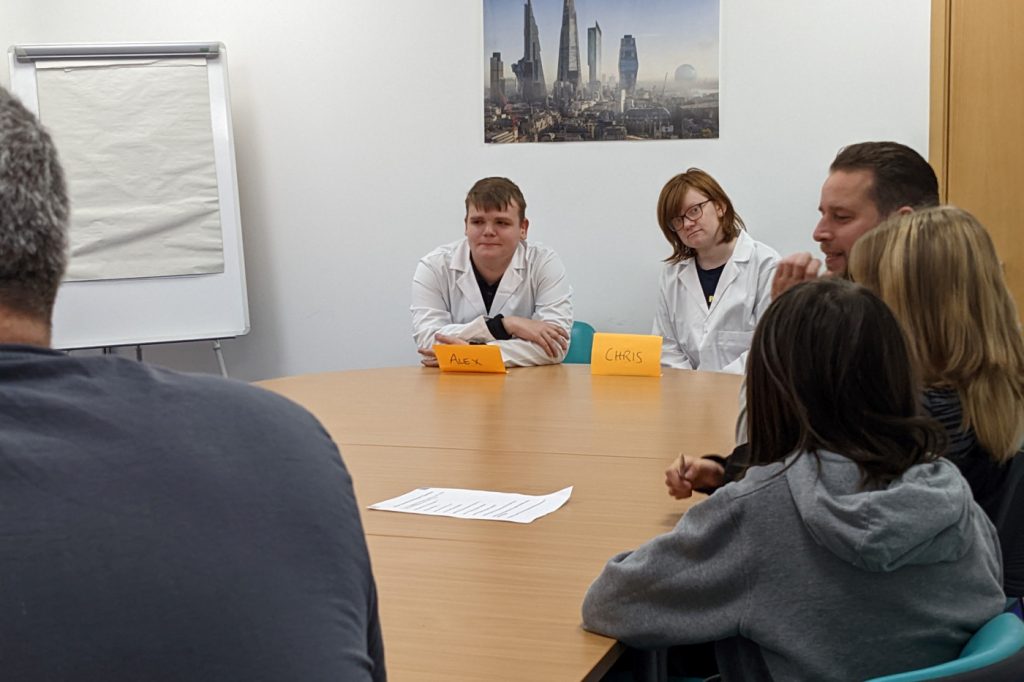
“Chris” and “Alex”, two of our actors.
They were based on autistic descriptions of camouflaging, which is when neurodivergent people consciously try to hide their differences and ‘act neurotypical’, from the way they make eye-contact, to copying their body language and speech mannerisms. Just like non-human characters are perceived more positively when they express emotions and social behaviours, autistic people are perceived more positively when they perform camouflaging behaviours, and it helps them avoid bullying or social exclusion. The problem is that camouflaging is exhausting, and it reinforces a sense of low self-worth. Autistic people who spend a lot of time camouflaging tend to have poorer mental health and also be more vulnerable to suicide.
We wondered whether the general public, who might be used to depictions of non-human characters, would be led to identify Chris (our stereotypical autistic portrayal) as the robot. Actually, we found that people were conflicted, with guesses balanced between the two characters. People noticed the Uncanny Valley aspect of Alex’s mannerisms, and knew there was something different about this character.
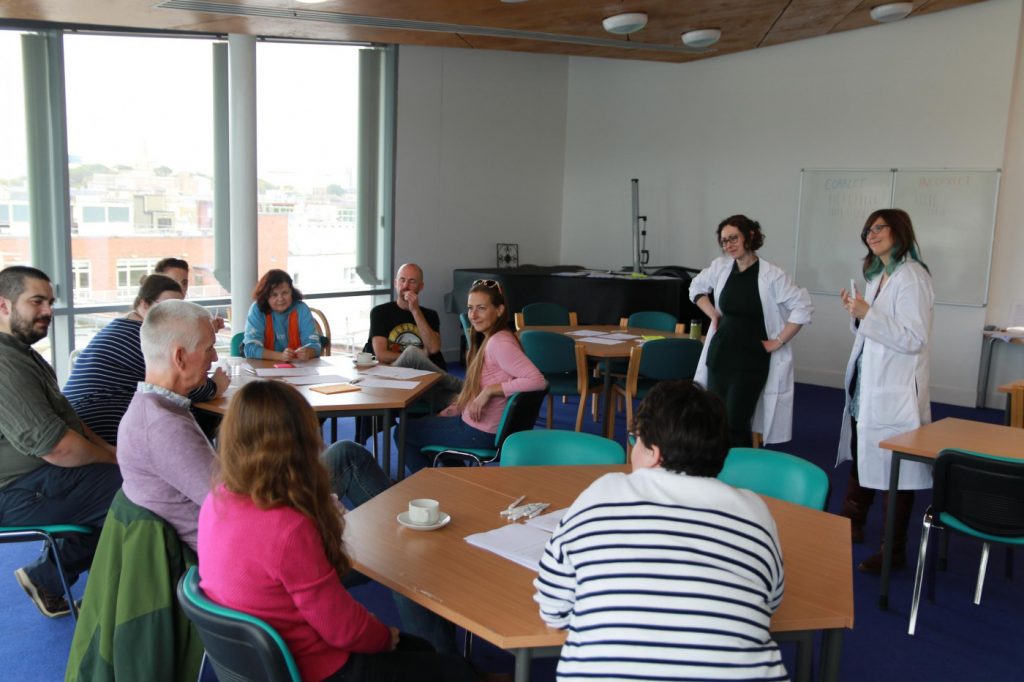
Max and Rachel in a discussion session with a group.
We explored their ideas about the traits they tended to associate with robot characters, and pointed out how these overlapped with representations of autism. In explaining how different types of brain give rise to different ways of socialising and communicating, we spoke about the painful efforts that autistic people go to hide their differences in order to be accepted. Concluding, we invited people to think about their assumptions of what it means to be human (and the inherent flip side of ‘not-human’), and the harm these assumptions could cause for people who don’t display those most common ways of behaving.
We measured the impact of this activity on attendees using surveys, the results of which might also feed into future research. Asked if the event increased their understanding of autism and empathy for autistic people, most of our respondents gave positive responses on the day. Those who responded two weeks later likewise gave mainly favourable responses, with one commenting “It was a very clever and accessible way to teach people about autism”, and others suggesting we should take the performance to schools. We especially valued one response by an autistic person in our audience: “I thought while watching that both could very easily be autistic and was scared that they might just say that being autistic was just like being a robot and that we had no feelings. Very happily surprised”
We ran the activity in thirty-minute slots throughout the day, welcoming over fifty attendees in total. Our immense gratitude goes to the Public Engagement team, our fantastic student actors, and our many colleagues who helped us during this event. We feel that the event was especially special in that it was co-produced, written and acted by an evenly split team of autistic and non-autistic people. One of our autistic actors had a fascinating and poignant insight into the double-bluff of playing a character who was camouflaging their autism just obviously enough for the audience to notice:
“Because I was so used to hiding it all … It was hard to not automatically revert back to covering it all up. Because the aim of being just an autistic person in real life is to try and not show your autism… So, it’s interesting to have to do that, force myself into that kind of corner in a way. … really seeing it and going, “Ah, but this isn’t what I usually do,” or “This is what I usually do,” or “Maybe I can do this in the future,” sort of thing. It almost made me feel slightly more comfortable taking in, kind of, showing a little bit more of me”
As we’re passionate about working towards a world where different ways of existing as a human are valued equally, we’re delighted with this feedback and look forward to taking our work further.
If you’re interested in engaging the public with your research, start by exploring what support is on offer at BU for research communications, impact and engagement. If you’d like to take part in this year’s ESRC Festival of Social Science, explore the other events that took place last year and look out for the call for proposals in March 2023.
*** DEADLINE EXTENDED TO 6th FEBRUARY ***
We are seeking expressions of interest (EoIs) for panel membership, Deputy Chair and Chair of the new Knowledge Exchange and Innovation Funding Panel.
What is the Knowledge Exchange & Innovation Funding Panel?
It’s the new, agile and responsive way that internally allocated funding for projects that support Knowledge Exchange and Innovation will be managed at BU from August. Panel membership is open to the wider BU academic community – not just the professoriate.
Panel Members:
Why should I apply to be a panel member? What’s in it for me?
Because being a member of a funding panel means that you are involved in making important decisions about applications for funding. This means you need to have a cool head to evaluate the applications and be able to express your thoughts about them effectively in meetings and via feedback. You will be directly involved in the process and therefore helping to ensure that internal funding at BU is used for projects that will have real world impact. It’s also a great opportunity to engage with colleagues from across the faculties and to bounce ideas off each other.
What do I actually have to do?
You will have to attend a few online meetings per year and to read and review funding applications. Not huge demands on your time, but there will be occasions when some detailed feedback maybe required.
Sounds like it could be interesting. How do I apply?
Please send a few paragraphs (no more than half a page) outlining why you think you’re suitable to be a panel member. Have you been on a panel before, for example or does your role require you to give feedback on projects? Are you simply keen to be involved? It would be very helpful if you could demonstrate your knowledge of KE, innovation and the impact agenda.
Please email your EoI to the KE & Innovation Fund mailbox by 5pm on Monday 6th February.
Chair and Deputy Chair:
We are also seeking EoIs from full members of the Professoriate for the post of Chair and from Associate Professors and Professors for the post of Deputy Chair. These posts are very important to the running of the panels as you will be chairing meetings, making decisions on applications and ultimately having the final say on funding decisions as well as dealing with requests to vary fund uses post award. For these reasons, we require applicants to these posts to have some experience of chairing meetings, sound knowledge of the impact and KE agenda and a keen desire to lead the research agenda across the university. There won’t be huge demands on your time, but you will be required to read and review multiple applications and there will be occasions when you may need to respond swiftly to requests to amend uses of funds.
Applications from underrepresented groups (minority ethnic, declared disability) are particularly welcome.
EoIs for the Chair or Deputy Chair roles should consist of a case (maximum length of one page) outlining your suitability for the role. Please outline your experience, your understanding of the KE and impact agenda and anything else you feel relevant.
These should be submitted to the KE & Innovation Fund mailbox by the deadline of 5pm on Monday 6th February 2023. Please ensure your EoI clearly states whether you are applying for the Chair or Deputy Chair position.
Successful candidates for the Chair and Deputy Chair roles will be required to attend an orientation meeting with Deputy VC Tim McIntyre-Bhatty on Thursday 9th March at 10am.
Please note that applications for Panel members will be processed following the successful recruitment of the above roles – this is likely to be after 6th March 2023.